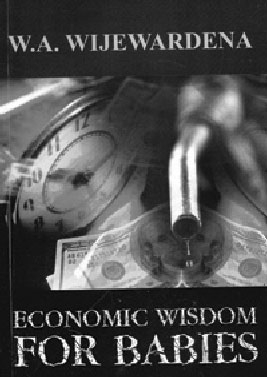This book consists of 39 essays written over a period of one year for a weekend newspaper. The great appreciation of the weekly column by readers has led to this.
The author, a seasoned Central Banker and currently the Senior Deputy Governor of the Central Bank of Sri Lanka, has been a policy maker, university lecturer, and an author of many papers on economic issues. The author begins by saying that as long as scarcity rules the world, an economic man should necessarily live in every human being. With that goes the main theme of the book, i.e., we are all babies when it comes to economic literacy. We make decisions and come to conclusions looking at only what is within our eyesight. We lose the big picture and so the wide range of repercussions that would follow our actions. The book therefore attempts to make economic literacy accessible to a broader spectrum of the population. The author tries to do this by fictionalizing economics.
The virtues of fictionalizing a subject are highlighted by the author in the introduction. This is not something novel. Ayn Rand attempted fictionalization of economic issues in her books starting with We the Living (1936). The 3rd century BC text called Panchatantra by Sage Vishnusharman to teach politics, economics, and government to princes had a fictionalized narrative. Above all, the Jataka stories that narrate the lives of the Buddha in his previous births also have fictionalized versions of economic systems of that time.

